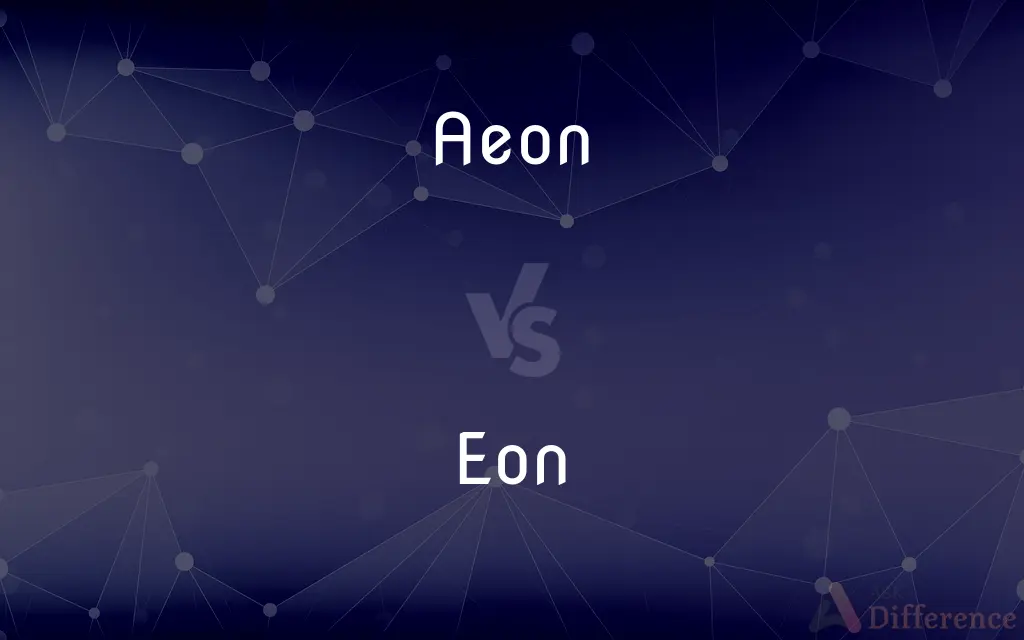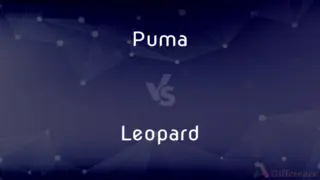Aeon vs. Eon — What's the Difference?
By Fiza Rafique & Urooj Arif — Updated on March 24, 2024
Aeon and eon both refer to an indefinite and very long period of time, but aeon often carries additional philosophical or theological connotations.

Difference Between Aeon and Eon
Table of Contents
ADVERTISEMENT
Key Differences
Aeon, in its original sense, pertains to life, being, or eternity in Gnostic and Platonist thought, embodying infinite time or the age of the gods. Whereas eon, more commonly used in English, denotes an immeasurably or indefinitely long period, often used in the context of geology or astronomy to describe vast periods of time.
Both terms can be used interchangeably when referring to vast, indefinite periods of time, highlighting their similarity in the context of temporal duration. However, aeon is sometimes preferred in philosophical, theological, or literary contexts, emphasizing its ancient and eternal qualities, while eon is more secular and scientific.
The concept of an aeon is imbued with qualitative aspects of time, often associated with cosmological, spiritual, or eschatological notions, reflecting eternity or the lifespan of the universe. On the other hand, an eon is quantitatively used to describe lengthy periods within the Earth's history or the universe's age, devoid of spiritual connotations.
In literature and discourse, aeon might be chosen to evoke a sense of mystical or eternal time, hinting at transcendent or metaphysical dimensions. Eon, conversely, is likely to appear in discussions about Earth's geological epochs or the vast stretches of cosmic time, grounded in empirical observation.
Aeon's dual use reflects its philosophical roots and common usage, signifying both a timeless existence and a significant temporal span. In contrast, eon strictly refers to extensive chronological durations, primarily in scientific contexts, without implying any metaphysical significance.
ADVERTISEMENT
Comparison Chart
Definition
An indefinite and very long period of time, with philosophical or theological significance
An indefinite and very long period of time, often used in scientific contexts
Origin
Greek, with philosophical and spiritual connotations
Greek, used in English to denote vast periods
Usage Context
Philosophical, theological, literary
Geological, astronomical, scientific
Connotations
Eternity, infinity, the divine
Geologic time periods, the universe's age
Interchangeability
Can be used interchangeably with eon for long time periods
Primarily used in a secular, scientific manner
Compare with Definitions
Aeon
Used to express the idea of timelessness.
His music captures emotions that feel as if they span aeons.
Eon
Scientific measurement of extensive time periods.
Geological eons are divided into eras, periods, and epochs.
Aeon
An indefinite, extremely long period, often with spiritual significance.
She spoke of love lasting for aeons.
Eon
Used to emphasize the lengthy duration of an event or process.
It's been eons since we last met.
Aeon
In Gnosticism, a divine power or emanation.
Aeons are considered manifestations of the divine in the cosmos.
Eon
A long period of time, used especially in geology.
The Earth's crust formed over eons.
Aeon
Symbolizing eternity in philosophical contexts.
The philosopher pondered the concept of the soul existing through aeons.
Eon
Denoting a significant era in history or the universe.
Dinosaurs roamed the Earth an eon ago.
Aeon
Reflecting eternal or ageless quality.
The ancient forest stood as if untouched by aeons.
Eon
Relating to the vast stretches of time in the cosmos.
The universe has evolved over eons, forming galaxies and stars.
Aeon
The longest division of geological time
Eon
An indefinitely long period of time; an age.
Aeon
The word aeon , also spelled eon (in American English), originally meant "life", "vital force" or "being", "generation" or "a period of time", though it tended to be translated as "age" in the sense of "ages", "forever", "timeless" or "for eternity". It is a Latin transliteration from the koine Greek word ὁ αἰών (ho aion), from the archaic αἰϝών (aiwon).
Eon
The longest division of geologic time, containing two or more eras.
Aeon
Variant of eon.
Eon
(US) Eternity.
Aeon
Alternative spelling of eon
Eon
A period of 1,000,000,000 years.
Aeon
A spirit being emanating from the Godhead.
Eon
(geology) The longest geochronologic unit, being a period of hundreds of millions of years; subdivided into eras.
Aeon
(Cosmology) Each universe in a series of universes, according to conformal cyclic cosmology.
Eon
A long period of time.
It's been eons since we last saw each other.
Aeon
A period of immeasurable duration. See Eon.
Eon
A spirit being emanating from the Godhead.
Aeon
A divine power or nature emanating from the Supreme Being and playing various roles in the operation of the universe.
Eon
An immeasurable or infinite space of time; eternity; a long space of time; an age.
The eons of geological time.
Aeon
The longest division of geological time; two or more eras.
Eon
One of the embodiments of the divine attributes of the Eternal Being.
Among the higher Æons are Mind, Reason, Power, Truth, and Life.
Aeon
(Gnosticism) a divine power or nature emanating from the Supreme Being and playing various roles in the operation of the universe
Eon
The longest division of geological time
Aeon
An immeasurably long period of time
Eon
An immeasurably long period of time
Eon
(Gnosticism) a divine power or nature emanating from the Supreme Being and playing various roles in the operation of the universe
Common Curiosities
Is there a difference in the pronunciation of aeon and eon?
In many cases, the pronunciation is similar or identical, though regional variations may exist.
Can aeon and eon be used interchangeably?
Yes, they can be used interchangeably when referring to very long periods of time, though aeon has additional spiritual or philosophical connotations.
What differentiates an aeon from an eon?
The main difference lies in their connotations; aeon often implies eternal or philosophical aspects, while eon is more secular and used in scientific contexts.
What is the significance of aeons in Gnosticism?
In Gnosticism, aeons are considered divine emanations, representing various aspects of the godhead and the cosmos.
How is eon used in science?
In science, an eon is used to describe vast, indefinite periods of time, especially in geology and astronomy.
What is an aeon?
An aeon refers to an indefinite and very long period of time, often with philosophical or theological significance.
Are there specific eons identified in Earth's history?
Yes, Earth's history is divided into several eons, such as the Archean, Proterozoic, and Phanerozoic.
How do aeon and eon relate to the concept of eternity?
Aeon is more directly associated with the concept of eternity, especially in philosophical and theological contexts, while eon relates to extremely long but more measurable periods of time.
How do geologists use the term eon?
Geologists use eon to categorize the Earth's history into significant, broad intervals of time.
Does the concept of an aeon have a place in modern philosophy?
Yes, modern philosophy can engage with the concept of aeons, especially when exploring ideas about eternity, time, and existence.
Why might a writer choose to use aeon instead of eon?
A writer might choose aeon to evoke a sense of timelessness or eternal significance, particularly in literary or philosophical texts.
Is there a scientific method to measure an eon?
While eons represent vast periods, they are divided into smaller, more measurable units like eras and periods, allowing for scientific analysis and categorization.
How do aeon and eon reflect human understanding of time?
They reflect the human attempt to conceptualize and communicate about vast, often incomprehensible periods of time, whether from a scientific or philosophical perspective.
Can the concept of aeons apply to personal experiences?
Metaphorically, yes. People may refer to aeons to describe feelings or experiences that seem to transcend ordinary temporal boundaries.
What is the practical use of eon in everyday language?
In everyday language, eon is often used hyperbolically to express a sense that something took or will take a very long time.
Share Your Discovery

Previous Comparison
Puma vs. Leopard
Next Comparison
Ferry vs. BargeAuthor Spotlight
Written by
Fiza RafiqueFiza Rafique is a skilled content writer at AskDifference.com, where she meticulously refines and enhances written pieces. Drawing from her vast editorial expertise, Fiza ensures clarity, accuracy, and precision in every article. Passionate about language, she continually seeks to elevate the quality of content for readers worldwide.
Co-written by
Urooj ArifUrooj is a skilled content writer at Ask Difference, known for her exceptional ability to simplify complex topics into engaging and informative content. With a passion for research and a flair for clear, concise writing, she consistently delivers articles that resonate with our diverse audience.














































